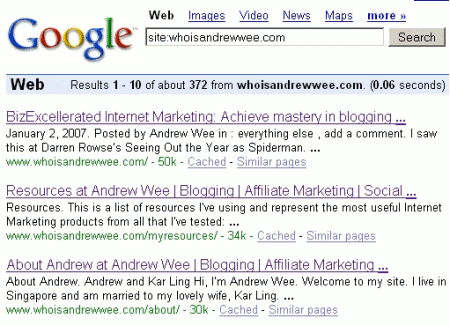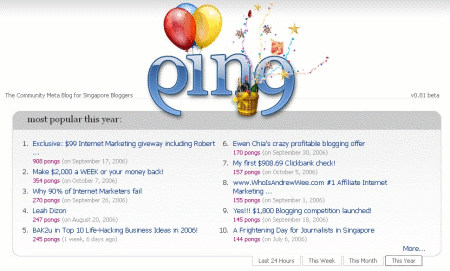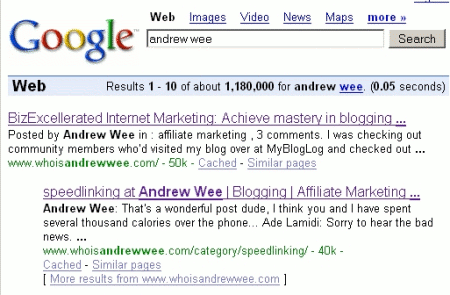I’m don’t go out of my way to do a lot of SEO, though I follow some basics such as having keywords in my URL.
It was a little shocking to find that my blog permalink structure was organized along the lines of /post ID/post title, resulting in URLs like www.WhoIsAndrewWee.com/214/meme-update.html.
Having the post ID (the numerical post identifier) has zero SEO value, so I changed it to /post category/post title, so it’d display as www.WhoIsAndrewWee.com/traffic-generation/content-based-posting.html.
Assuming your categories are optimized for appropriate keywords, the search engines will send you more targeted traffic.
One important caveat about this permalink structure is that you have to file each post under a single category. Filing a post under multiple categories would not be good and override any keyword benefits derived from this permalink structure.
Before you make changes to your permalink structure, take note.
There is one devastating consequence to revamping your structure. All previously indexed posts will be lost (a natural consequence of changing your URLs from “/1273/post” title to “/monetization/post title”. You’d want to ensure that your “404 File Not Found” error pages are configured to forward to an appropriate page, or ensure that your theme’s “page forwarding” configuration is set correctly.
Here’s what I’ll be losing in the process of permalink revamp:

A bulk of the 372 pages indexed in Google. A similar number for the other search engines.

A loss of links at meta blog Ping.sg for which I occupy 7 of the top 10 most popular posts this year.
Here’s an interesting discovery though.

I’m ranked tops for the phrase “andrew wee” on Google and the other search engines.
Which might not sound that impressive, until you consider that the incumbent, another andrew wee, was on a very established, mature domain and appeared to be immovable.
—
Although revamping the blog permalink structure might seem very painful. It does provide several long term benefits.
Short term pain for long term gain.
Note: This technique is focused mainly on the WordPress blogging platform.

I set my permalink structure to http://www.domainname.com/postname and it has been the best decision I ever made with my blogs.
Hi Char,
if you change it to http://www.domainname.com/category/postname you’ll start to see an increase in traffic once the posts get indexed.
the other workaround for this is to include your keywords in your post titles, but that may bind your wrists creatively…
Andrew. Instead of just letting your old urls 404, you may be able to reatain any old link pop you have to your old pages.
set up a 301 redirect from the old pages to the new pages. I think there are some wordpress plugins to handle this, or you can simply add a line in your .htaccess for each old page. If there are too many, just do the ones that you know have backlinks and/or get traffic.
Scott,
tks for the suggestion. I’ll think about it, though there is quite a lot of work involved.
The 404 page for this template is embedded with the related posts plugin, so there’ll be at least 5 posts for them to choose from.
I’ll check out the 301 plugins (or bug the 9rules Web++ community people about it).
I think I know which andrew wee you were referring to.
Adrew,
I am interested to find out more about 301 redirect. I have the permalinks set as /postname/, and Google has indexed well over 300 pages. I am contemplating to seti it to /category/postname/, but is it really worth the trouble?
Hi Vlad,
it depends on your intentions.
if you’re in this for the long haul and eventually see yourself publishing 5,000 or 10,000 posts, i feel 300 posts is a drop in the bucket.
if you have tools to track backlinks to your more popular posts, you can follow Scott Jangro’s advice and set up the appropriate redirects.
It also depends how optimized your content and keywords are.
in the beginning, I didnt adopt a very content-focused approach, so losing those posts, while a little painful, doesn’t make a lot of difference in the long term.
bottomline: if you have anchor/pillar posts which people are coming to, or have been dugg, you’d want to redirect. else the benefits in terms of keywords (especially in the search engine’s eyes) would be worth the trouble.
Thans Adrew,
I have another site that I may be able to try this on. Also all of my sites have Google Sitemap plugin, do you think this may help Google to re-index the pages quicker?
Hi Vlad,
BTW my name is ‘andrew’…
How fast you get re-indexed depends on the next Google bot visit to your site.
If you have access to awstats, it’ll show when the bots last visited.
I think the issue is more of what you’ll do with the pages that have already been indexed, so new visitors, finding you from the search engines, don’t bang into a ‘not found’ page.
Hi Andrew,
Something else to think about re: SEO and blogs. This relates to our discussion via your note on 9rules. Why use Technorati Tags and create all of those links for the benefit of Technorati? Why not use tags but keep all of the links on-site. That’s what I’m experimenting with via TagBuildr which creates what I’m calling Apogee Tags. Try it. For one post, use Apogee Tags instead of Technorati Tags. Your post will still be tagged on Technorati. Wouldn’t you rather link to my site instead of Technorati? I’d more more than happy to help you set up Wee Tags so you can keep tags on your site. 😉
Thanks for this useful tip. I had the old /post ID/post title structure and have just revamped my permanent link structure to incorporate
/category/post title.
How do you ensure that your “404 File Not Found†error pages are configured to forward to an appropriate page?
Or how do you ensure that your theme’s “page forwarding†configuration is set correctly?
Pingback: OnlineGist - Home Based Internet Marketing Business Blog » Blog Archive » SEO Tip
Hi Richard,
Tks for the offer. It’s something to think about.
If I’m keen to take it up, I’ll certainly let you know.
If you haven’t done so already, maybe you might want to blog about your offer and I’d be more than happy to send folks over to your site.
Hi Ade,
If you want to go the whole hog, there’s nothing to stop you from adding further keywords to your permalink structure.
you can follow a /keyword/category/post name link structure if you really want to.
For example, http://www.digitalkeiretsu.com/internet-marketing/category/post name.
One thing though, my personal preference is to go with generating good quality content, rather than spend too much time on SEO tweaking.
At the end of the day, you want human traffic that keeps returning to your blog, rather than 1000 hits from the search engines, but don’t come back because of inferior content.
I can’t give you precise technical details, but I know that Denis over at Semiologic strongly suggests including dates in permalinks.
This is because if you remove them, it adds a huge MySQL overhead on your server.
The SEO benefit of making this change is minimal as it is only one of 100+ factors Google look at, and search engines are smart enough to tell the difference.
There might be some arguement on a niche site using WordPress as a CMS, if you don’t want your content to have date relevance when listed in the SERPs, but for a blog that you intend to be long-term, I would stick to the longer URLs, even longer than the ones you already had.
Hmm, thanks for your feedback, Andy.
I’d looked through my indexed pages and I guess the post ID labelled ones didn’t seem to stand out too much.
I guess at a later stage when I’m more focused on the SEO aspects, I might revist it.
For the short term, I’d likely focus on the content generation aspect.
The problem with WordPress is that multiple pages contain the same content, thus Google decides which one to show.
If this worries you, there are plugins you can use to prevent duplicate content issues. Depending on how your archives are setup, you might lose traffic based on different keyword densities etc.
If you have the time, there are lots of things you can do, but I would stick with longer permalinks, and as someone has already suggested, use 301 redirects if you change things.
Something else to think about
On MSN
linkdomain:whoisandrewwee.com -site:whoisandrewwee.com
2,828 results
Pingback: Recover Lost Blog Traffic with Killer Plugin at Andrew Wee | Blogging | Affiliate Marketing | Social Traffic Generation | Internet Marketing
Ok, Andrew, here’s a post about using TagBuildr to create blog tags. Also, here is the TagBuildr FAQ.
BTW, hope you are enjoying your visit to the States.
Pingback: Step 3: Optimize
Pingback: Step 3: Optimize - Novelr - Making People Read